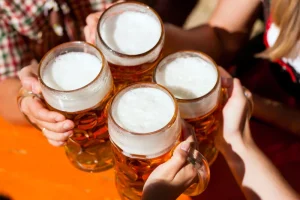How Long to Get Back into Ketosis after Drinking Alcohol?

If you have specific health concerns, it’s always best to consult with a healthcare professional. I know that alcohols are more volatile than water and that ethanol boils at only 78 degrees as opposed to 100 degrees Celsius for water. I could open the bottle of wine in the shade, even the shade from my own body, and I should be able to remove alcohol from the wine by letting it evaporate.
Tips for Letting Go of Toxic People (Without the Guilt Trip)
- Therefore, alcohol induced dehydration can occur when drinking alcohol without having a glass of water–or more, depending on how much alcohol you’re drinking.
- The Hangover IV is extra hydrating as well, as we know that many of the common symptoms of hangovers are directly due to dehydration.
- Before we delve into the effects of wine, it’s essential to understand what dehydration is.
- The amounts can vary depending on your personal response, heat index, and the type of activity.
- However, when it comes to its impact on hydration, there has been some confusion and debate.
Follow the following steps to enjoy your beer and still remain hydrated. Finding the right supplements can be overwhelming with so many options on the market. Whether you’re looking to build muscle, increase endurance, or speed up recovery, natural supplements can provide the support your body needs without artificial additives or harmful chemicals.
Is Wine Dehydrating
It’s very easy for your body to process and for your intestines to absorb. If you drink a glass of water for each glass of wine you down, you may never feel the effects of dehydration at all (and you’ll still get a slight, though pleasant, buzz). Generally, if you have already eaten a meal or if you are drinking a glass of wine with your meal, you won’t experience many of the effects of dehydration, if any. However, if you have an empty stomach, a single glass of wine will cause mild dehydration if you don’t follow it up with a glass of water within the hour.

Reduced Vasopressin Production
This guide will break down the best high-quality workout supplements, helping you choose the right options for pre-workout energy, post-workout recovery, and overall athletic performance. Carry mineral tablets or liquid mineral drops with you for emergencies. These can be added to water or juice for quick and lasting hydration (your cells will thank you!).

Dehydration occurs when your body loses more fluids than it takes in, leading to an imbalance in the body’s electrolytes and affecting essential bodily functions. One of the most common questions regarding alcohol consumption is whether it can lead to dehydration. Specifically, many people wonder if wine, a beverage enjoyed by millions worldwide, has the potential to dehydrate the body. This article aims to address this question directly and explore the relationship between wine and dehydration. Don’t assume that a single glass of wine will overly dehydrate you, but keep in mind that wine is generally can wine dehydrate you dehydrating compared to other alcoholic beverages like beer.
Wine’s Potential Antimicrobial Properties Explored

One of them is acetaldehyde, a harmful compound that can trigger inflammation and impact liver cell function. The body perceives ethanol as a toxin, and the liver prioritizes alcohol detoxification over most other metabolic processes. In addition, many types of alcohol are flavored with sugars and syrups or are mixed with sugary soft drinks and fruit juices. In severe cases, dehydration can lead to more serious complications requiring medical attention.

As a central nervous system depressant, alcohol slows the body’s systems and leads to noticeable changes in cognitive and physical functions. In a few minutes, you’ll feel the effects of the IV drip therapy and may experience your hangover symptoms vanish into the ether. Next Health clarifies the relationship and difference between alcohol and hydration. The key to avoiding dehydration is to pay attention to how your body responds to alcohol. So what can you do to make sure you don’t get that infamous hangover headache caused by dehydration? Let’s find out and get a little background on why alcohol dehydrates you in the first place.

Dehydration from Alcohol: How to Bounce Back from a Hangover (Or Prevent One)
This leads to a broader exploration of how to enjoy alcoholic beverages while prioritizing hydration and overall health. While alcohol can have a diuretic effect, other beverages like coffee, tea, and some soft drinks can also contribute to increased urine production. Excessive consumption of alcohol can lead to negative health effects and alcohol-related dehydration. Red wine has long been touted for its potential health benefits, from its heart-protective properties to its potential role in preventing certain types of cancer. However, when drug addiction it comes to its impact on hydration, there has been some confusion and debate. Despite the diuretic effect of wine, it’s crucial to consider the hydration factor.
